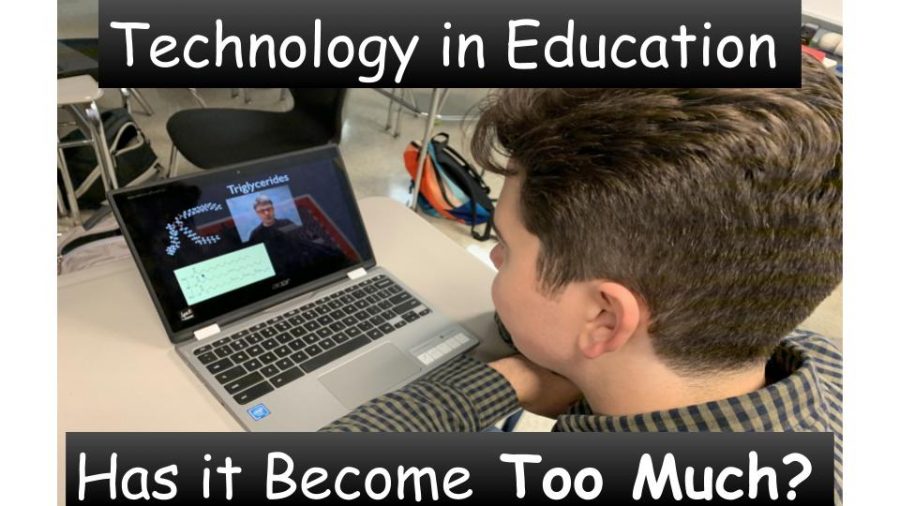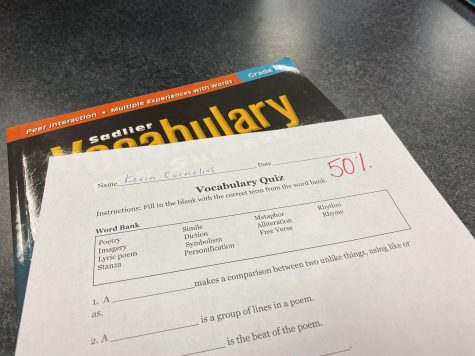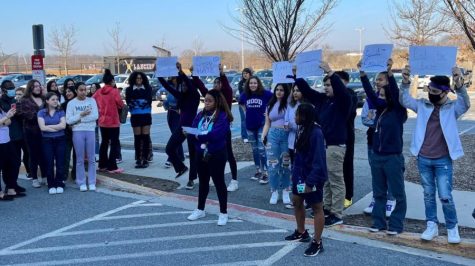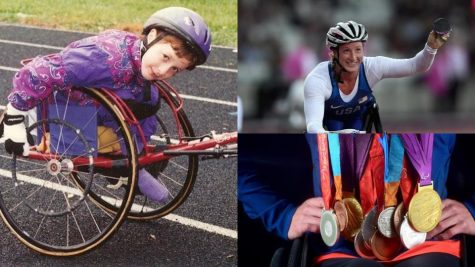Don’t BYOD: Leave your cell phone in your backpack
Senior Jacob Blue watches an informational YouTube video during class.
September 27, 2019
At the beginning of the school year, Kristen Canning, a teacher at Ballenger Creek Elementary School, read a bedtime story to her students via Facebook live-stream. The live-stream helped build personal connections between her and her students, encouraged reading, and set an example for parents to read to their children.
“Ultimately, we want technology to provide opportunities for students to connect in ways they could not without it. Social Media, in many forms, can do that for us,” said Canning.
I’m not saying that our principal Ms. Doll should read to us, but it serves as a great example to the advancements technology has made to help educate our generation of students who have grown up in an age filled driven by smartphones.
As great as these advancements are, educators and parents must take a balanced and calculated approach for using technology for learning. Too much technology can result in students becoming immersed in their devices, missing out on the literacy that learning through devices is supposed to improve.
“Technology will never replace an effective teacher, but when used correctly it is a valuable tool for an effective teacher to use,” said Canning. “The educational value of technology is dependent on the way it is used. If it is simply a replacement for a worksheet or a place for students to access games for practice then it will never have the impact that it could have.”
How much technology is enough, and at what point will it harm a student’s literacy and ability to learn? I would argue that we are tipping the scale now.
In 2014, Frederick County Public Schools (FCPS) introduced the Bring Your Own Device (BYOD) program. This allowed students to bring their personal devices to school for educational use.
Eventually, the county began to transition to providing 1:1 Chromebooks for all middle and high schools. Many students, including junior Julian Rodriguez, loved the convenience that this transition brought. “Computers help in the classroom because students can complete work quicker, and it also saves paper,” Rodriguez said.
With this change, schools found that not only was the BYOD program no longer relevant but that it caused students to become distracted in the classroom.
Linganore has followed other FCPS schools who have since tried to strike a balance by moving away from BYOD and implementing a no cell phone policy in the classroom.
Website restrictions for entertainment and other limitations guarantee that any device use through the school system is for an educational purpose.
At first, FCPS and schools like ours let anything go with technology and it disrupted the balance of focus and learning. Five years later, the administration has attempted to restore that same balance by limiting student access to the tools of distraction accessible through devices.
Junior Morgan Miller feels that this backtracking toward traditional education is beneficial to her learning. “Having to utilize your resources to scan the internet for answers is tedious. I would much rather use a textbook for my work. I am much better in the classes where I mainly use textbooks.”
Literacy is one of the most important skills grown through education. Developing reading and critical thinking skills through reading affects students for the rest of their lives. I think people who read have more empathy and are more able to relate to others.
In this world that we’ve grown up in, with our heads down in our phones and our eyes fixated on television screens, we’ve traded in the ability to be literate and to read and understand information.
Information can be found in seconds and has revolutionized teaching through tutorial videos, educational movies, and of course, online classrooms, but is it deep learning?
Online classes, with their ever-expanding relevance in our modern-day educational system, have a lot of positives. They are geared toward making education more convenient for students and teachers and can be a time and cost-effective option for those who need it.
But do they have the same success in comparison to traditional classes? Studies say that online classes have a higher dropout rate and lower completion rate in comparison to traditional classes. Those who take online classes also have been shown to move on in education more slowly than those in traditional classes. Online classes also lack the face-to-face interactions and the ability to get immediate help and support that traditional classes offer.
Online classes simply don’t offer the kind of deep learning to students as much as real-life classes do.
Naysayers have said that school and the education system hasn’t changed in 100 years. I don’t think that’s true. The education we receive today has evolved and adapted to the technology-heavy time that we live in. The way that information can be presented and found through the use of technology is barrier-breaking.
Too much of a good thing is detrimental to preserving literacy and interpersonal skills. So far, we haven’t learned to strike a balance.














